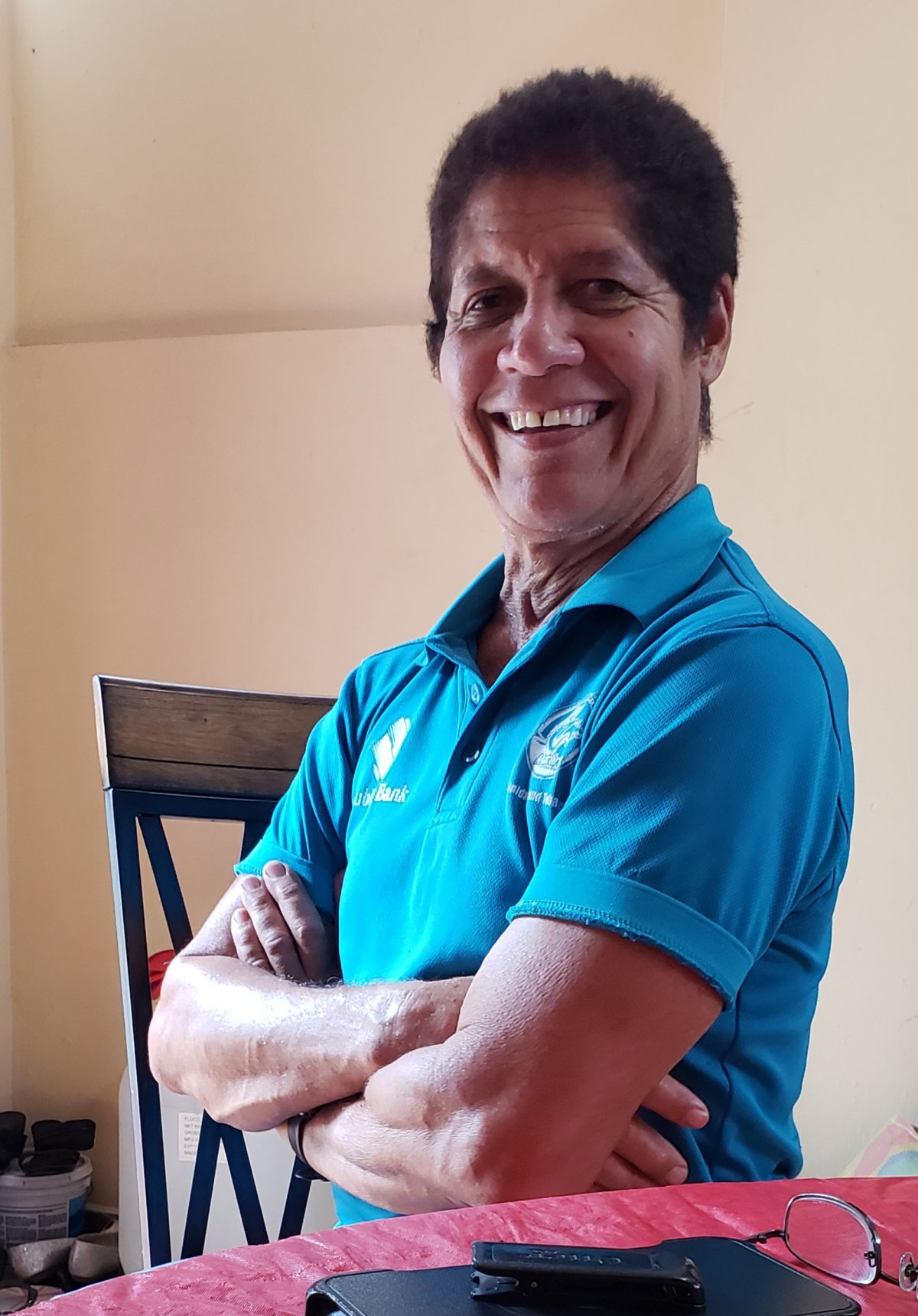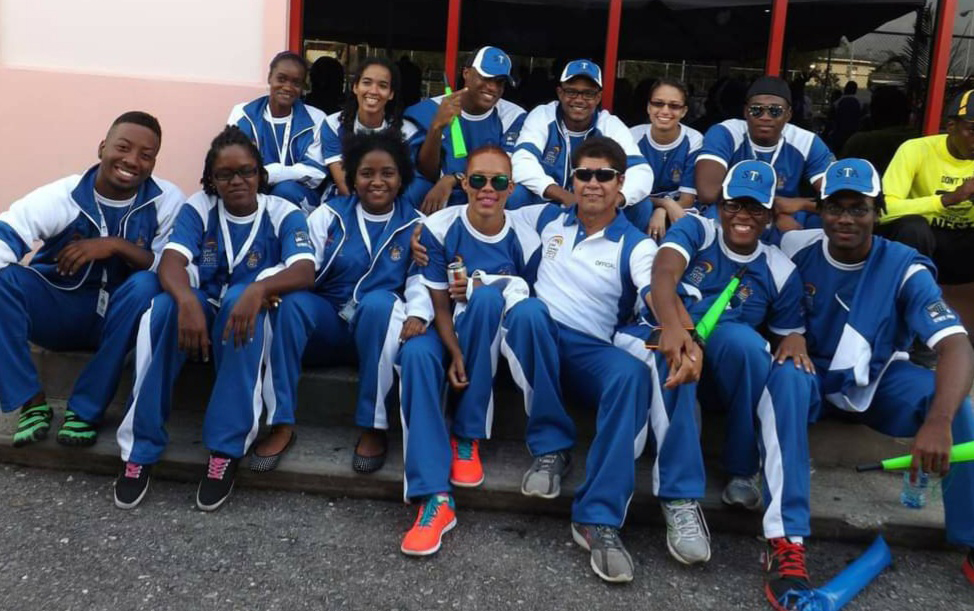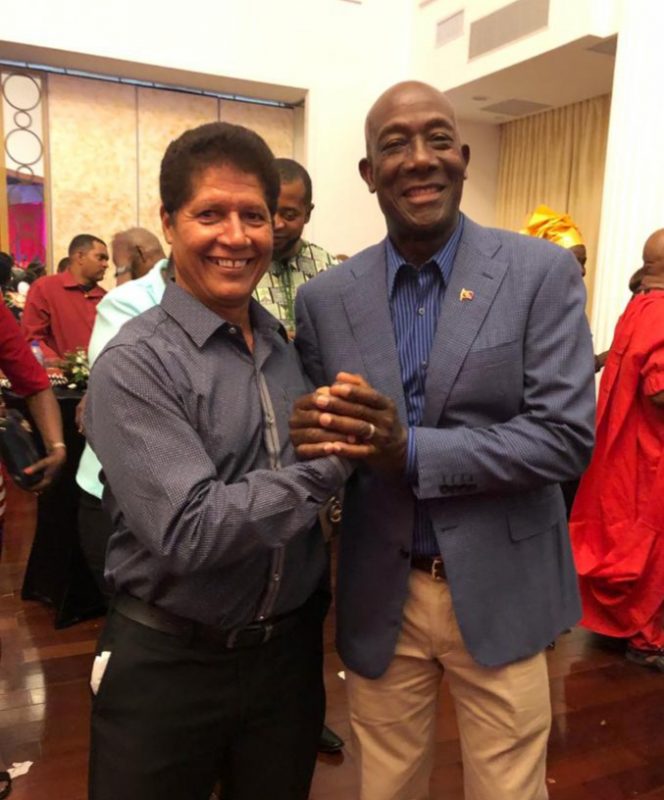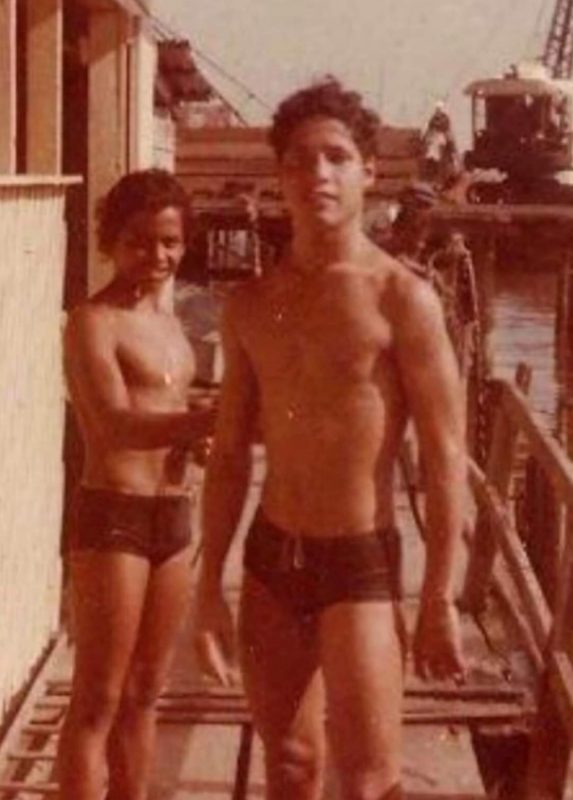Throughout his life, Maurice Faria has made a career of being in the water. A Trinidad and Tobago (TT)-based Guyanese, Faria, now 62, is a former Guyana national swimmer, swim coach, commercial diver, physical education teacher, mentor and a maintenance and pool construction contractor.
Faria, who was born in Hadfield Street, Georgetown and who migrated to TT in the early 1980s, told Stabroek Weekend in a recent interview in Port of Spain that because of his versatility, he has survived the economic fallout from COVID-19 to date.
“No coaching and swimming is taking place. There is no construction of pools at this time but some sectors that the government keeps as essential services require the maintenance of pools for therapy. Apart from the maintenance of private pools, therapy is being done at commercial pools such as at Marlins Swim Pool which I am in charge of.”
Faria was coaching swimming along with commercial diving when commercial diving went under due to the crash in oil prices in the mid-80s. Because coaching was not a lucrative career but one that he loved, he took up the maintenance and construction of pools. “I always advise swimmers, youngsters, that it is good to have two or three degrees or professions because you never know what could happen. In 1986 when commercial diving fell right down when the global price of oil crashed in 1985/1986, as a commercial diver, I was able to turn around and do swim coaching, pool maintenance and construction of pool,” he explained.
Now having been a national coach for 38 years and 25 years as head coach for the TT national team, he said, “My advice to any young person who loves swimming and who wants to be a coach is, do it from your heart. Don’t let anyone tell you not to do it. If I had listened to people telling me that everyone who coaches swimming will be broken, I might have turned away from a lifetime of my own happiness, and the happiness of children and of people who love the sport.”
He added, “If you are looking for financial reward, there is none. There is a stipend that help you travel to the pool. Until you reach the national level or the university level, that’s where you get a little more than a stipend based on your contract.”
Faria began swimming from the age of six and entered competitive swimming in the nine to ten age group in Guyana. A distance swimmer, he won the 25-mile river swim from the Timehri Docks to Georgetown in 1977, and again won the 25-mile river swim in Brazil in 1978. In the same event, he placed second in Venezuela in 1979.
He represented Guyana in the 1977 and 1978 Inter-Guiana Games and was the record holder for the backstroke in 1977 and in the breaststroke in 1978. “The newspaper had some nice reports about me back in those days. My records stood for almost 25 years. Orlando Thom broke my breast stroke record and Nicholas Fraser, the backstroke.”
In 1980, he took part in the Central American and Caribbean Games in Trinidad. “It was the first time that Guyana through the Guyana Amateur Swimming Association took part in the games in a long time since the 70s. We did very well and we went home with some medals. It was held at the Marlins Swim Pool and it was the first time that Guyanese swimmers were exposed to a 50-metre pool. Most of the pools in Guyana are 33 and ⅓ metres. From the CAC Games we used to go to the Marlins Invitational in Trinidad. So, we would have taken part in 1980, 1981 and 1982 December. Those meets were held just after Boxing Day, on the 27th, 28th and 29th. December—because flights around that time were cheap.”
‘Since I know myself’
Faria was very familiar with TT as his family had owned businesses there as well as in Barbados and Guyana. As a child he had been travelling regularly to Trinidad and Barbados, initially on vacation and then as a teenager to work with the businesses.
At that time, too, the Faria family was into gold mining in Guyana and ran a business, Farrel Engineering. “I was tired of that. I came to Trinidad to explore what I could do for myself. I went to Miami in the early 1980s to train to become a commercial diver and a level one and level two American Swimming Coaches Association (ASCA) swim coach. I studied commercial diving three days a week, and did ASCA levels one and two and swimming pool maintenance on the other days. When I was finished with pool maintenance, I studied swimming pool construction. So my life has been in, and related to water since I know myself.”
“With the exception of 2020 and 2021, because of COVID-19, I have gone to every ASCA clinic in Miami since 2000 to now. The clinics help in understanding changing techniques and new equipment to help swimmers.”
Faria returned to Trinidad and started coaching with the club, Blue Dolphins, in 1983.
“I have never stopped coaching since then. In this country, before you become a national coach you have to coach at the club level for at least five years. You have to coach swimmers to a certain level before you coach the national team to represent the country. As you produce swimmers and have them making qualifying times, then you will also qualify to become head coach of the national team. It took me nine years of coaching on the national team before I became a head coach of TT national team.”
Through all his travels with TT national teams, Faria travelled on a Guyana passport. “I have a Guyanese national identification card. I have never had a Trini passport. I thought I needed to see how far I could go as a coach in Trinidad to show my fellow coaches it is so easy, and if you need to climb the ladder in coaching at any level in any country, you can do it.”
While he was a swimming coach and physical education teacher at St Mary’s College in Port of Spain, Faria claimed, “We never lost an inter-collegiate championship in swimming in those days. As a young coach at Blue Dolphins and out of a full-time job, he was recruited by the St Mary’s sports master. The school, one of TT’s leading all-male secondary schools, at the time offered the sporting disciplines in basketball, hockey, football, swimming and cricket. He knew the rules of swimming and cricket and so he had to learn the rules of other three disciplines.
“Learning the rules of the others sports was simple and so I ended up being the PE teacher.
Because I was only required to do PE during the afternoon hours, I was able to start my swimming pool maintenance business and over a period of time, I went into the construction of pools. Those, I have also been doing since the 1980s until now.”
“Commercial diving on my part involved working with the oil rigs. After I became a diver, I specialised in commercial diving to do salvaging and pipe laying. In those days, the pipes were made of steel and cast iron. We had to remove the cast iron pipes and replace them with plastic pipes for the transportation of oil and gas. For two years, I was based in Cedros, which is closer to the mouth of the Orinocco River, where the water is murky and you cannot see in it. If you want to see, you have to carry a light and you will see one foot in front of you. I was comfortable diving in the murky areas. The water in the Cedros area is very brown and they have a lot of oil rigs out there. That is where I was doing the pipe-laying. With salvaging they didn’t need me until 1981 when one of the compressors on a floating oil rig fell overboard during heavy winds. We had an area to search and their own divers didn’t locate it. I was sent by the company I was working with to assist. I found the piece of equipment and I was given an award for finding it. The equipment had cost US$18,000.”
UWI head coach
Faria was head coach of the University of the West Indies (UWI) St Augustine Campus since 2007 and was awarded “The most persistent and dedicated coach” for the University of the West Indies in 2019 at the conclusion of The UWI Games held at Mona Campus, Jamaica.
At UWI, students swim in three categories: Firstly, competing with local clubs, then at the inter-UWI Campus Games and finally at the World University Games.
“We have only had two athletes that went to the international level, including Guyanese Samuel Clarke,” Faria said.
UWI Swim Club members over the years broke several records at national levels. “Out of the eight games that St Augustine Campus went to, we won seven outright in the male and female categories. We also had individual records in these games. The organisers of the games were surprised that our swimmers were homegrown.”
Apart from Clarke, Faria noted that Noelle Smith, a former Guyana national swimmer and Hannah Latchmansingh also represented UWI. “The swimmer I had the longest and performed to the highest standard was Noelle Smith who made it to four University Games. She represented UWI at four nationals long course and four national short course meets in TT. She held the 18 and over top place trophy three times. Three times in the short course she had to share it with one of the swimmers from UWI. She had a second place to the same swimmer from UWI. For the long course, she won that twice and one second and one third. She was one of the most outstanding swimmer we had there. She had several records that I sent back to Guyana based on her performance at UWI. She was one of the swimmers from UWI who went to represent Guyana in the Inter-Guiana Games in Suriname in 2010 where she was the top swimmer of the 15 to 17 age group.”
In 2008, when Faria returned to Marlins as a coach, former Guyana national swimmer Jessica Stephenson went to live in Trinidad. “She trained with me, while representing Guyana, for the Goodwill Games, which were held in Trinidad. She performed at a high level and was very successful in the 100 and 200 metres breaststroke in her age group. The following year Jessica made Carifta Games and she went with a Trinidad coach to represent Guyana. I was on the national team of TT. She won the 50, 100 and 200 metres breaststroke for Guyana that year in Aruba. All three were Guyana records and two were Carifta records. She went on to do more things at Carifta, Central American and Caribbean Swimming Confederation (CCCAN) championships and the Caribbean Islands Swimming Championships (CISC). By that time, Jessica was transferred to another coach. I played a major developmental role in the beginning of her career.”
Other outstanding swimmers he coached at different age groups levels included TT Olympic bronze medalist George Bovell III at Blue Dolphin. He also coached him on several national teams in the 11 to 12 age group on teams to the Carifta Games, CCCAN and CISC.
“My contribution to George Bovell III was to see him perform in the age group level. He left the country at 13 or 14 years to attend the Bolles School in Miami, the same path several other Caribbean swimmers took before going on to universities. Olympian Anthony Nesty of Suriname used the same route.”
And even though he coaches the TT national team, any Guyanese swim team or swimmer travelling to TT for any meet can expect some form of assistance or advice from Faria.
He was also a coach of TT’s most recent Olympian, Dylan Carter. “The same year I had Jessica, I had Carter and Joshua Romany, another swimmer who swims for TT in the same age group. It is important that coaches recognize that the importance in swimming is the ground work.”
One of his greatest achievements was as head coach of the TT national team in 2018, when it won the CCCAN championship. “We were able to pull it off because of certain systems we put in place to create that camaraderie with all the coaches in the country to get it working. We were honoured when Prime Minister Dr Keith Rowley held a dinner for us.”
Faria prides himself as one of the coaches who has worked with every coach in the country. “Everyone has something to offer. I have had the opportunity to work with five clubs as a coach plus national teams and swimmers. That is because I did it from my heart.”
As a coach at the university level, he has had to mentor a number of students. “You have to develop trust. You have to understand that they want you to listen, to support them and to help them clear the way so they could see a path they should take. Most of all I found that some of them could go home and not be able to express themselves because home might be too busy or too empty. They may have problems they can’t discuss with anyone around so they will discuss with you knowing that you are confidential.”








